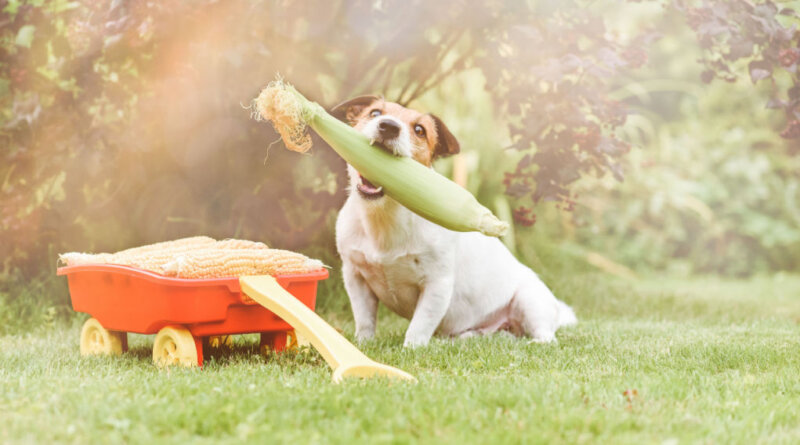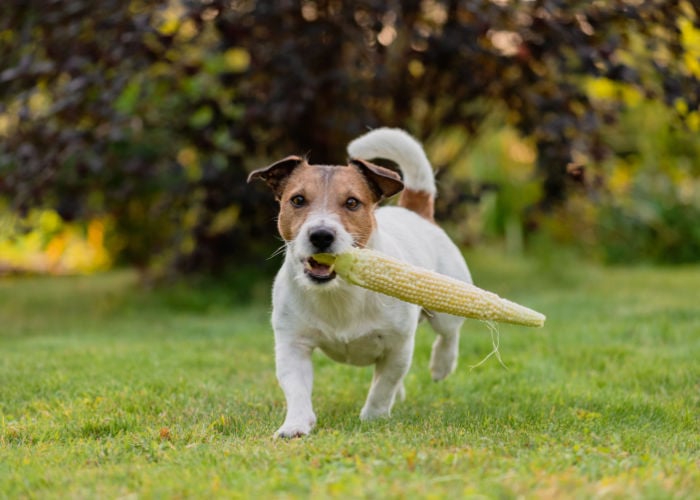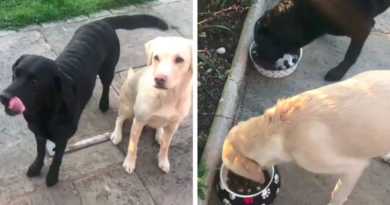Can Dogs Eat Corn? (And Other Corn Forms) – Top Dog Tips
Can dogs eat corn? Can my dog eat this delicious summertime favorite?
When preparing fruits and vegetables, you might enjoy tossing your dog a piece of pineapple or a carrot as a reward.
What about corn, though?
We enjoy wrapping corn in foil, tossing it on the grill, coating it with butter, and seasoning it with salt. We love to add kernels to salads too!
But sometimes, we wonder whether it’s safe to feed this delicious treat to our wonderful and good dogs.
So, is corn good for dogs?
In this article, you’ll learn the benefits and limitations of giving corn to your pawed friend. Along with these are the types they can and can’t eat.
Without further ado, let’s begin!
Can My Dog Eat Corn?
Corn is good for your dog’s health and can thus be included in a well-balanced diet.
Leaving the cob aside, corn is completely fine for your dog to eat. It’s even a common primary ingredient in commercial dog meals.
It’s one of the most consumed cereal grains worldwide and offers a variety of healthy nutrients such as vitamins and minerals (which you will learn more about later).
How can I serve it to my dog, though?
Once the corn has been cut from the cob, you can serve it to your furry buddy. Additionally, cooking it beforehand can help your dog digest it more easily.
Most of us like to grill our corn and season it with salt and butter to make it taste better.
Keep in mind that we should not prepare it the same way when feeding it to our dogs. The high-calorie density and fat content make it unhealthy for them.
According to PetMD, consuming too much salt might give your dog digestive issues like vomiting and diarrhea. Seizures and even death might occur in the latter end.
If you want to share any of your corn with Fido, you must observe limitations.
Remember: Moderation is key.
Is Corn Good for Dogs?
Corn is beneficial for dogs as long as you don’t feed it too much.
It’s high in protein, carbs, fiber, antioxidants, and linoleic acid, making it an excellent approach to boosting the nutritional content of our dogs’ food while using as few ingredients as possible.
Let’s take a look at how these nutrients benefit your four-legged friend.
Fiber
Fiber keeps the digestive process moving, reducing your dog’s risk of developing diarrhea or colon cancer.
In addition, it helps control blood glucose levels and reduce fluctuations, which helps manage diabetes in our dogs.
Protein
Building healthy muscles, bones, and joints needs protein. It even benefits the nerves, immune system, and skin health of your four-legged friend.
High-protein dog food might also be beneficial for senior dogs. The amino acids in proteins enhance muscle repair as they age.
Antioxidants
Your dog needs antioxidants for a better immunological response. You can protect Fido from environmental toxins by including it in their diet.
Additionally, it can benefit dogs that battle allergies as well as skin and coat issues.
Linoleic Acid
Linoleic acid promotes healthy skin and hair. It contributes to your dog’s skin health by protecting the skin’s outermost water barrier.
It can help relieve inflammations caused by flea bites, food, and inhalational or contact dermatitis.
Carbohydrates
Carbohydrates can provide our pets with a healthy energy supply while also powering muscle movements.
Additionally, it’s wonderful for the digestive system, which leads to the production of much easier-to-manage poops.
Can Dogs Eat Corn Cobs?
You shouldn’t let your dog chew on corn on the cob since they are difficult for their stomach to digest.
While it might appear like a fun treat-and-play mix for your four-legged companion, corn cobs are easy for dogs to break and chew, but they’re difficult to swallow.
It could result in gastrointestinal injury if they attempt to gulp down an entire corn cob or take huge bites. Even surgery could be necessary to get rid of it.
Corn is fibrous and will remain intact in the stomach of your dog. It can travel through the stomach and into the intestines, where it’s most likely become lodged.
If you suspect your dog has ingested a piece, keep an eye out for vomiting, lethargy, and dehydration.
Can My Dog Eat Popcorn?
If you want to give your dog a light snack, you can give them a little amount of air-popped popcorn.
Is it bad for my dog if I want my popcorn with toppings?
The cheese, butter, salt, and other flavors are the stuff that makes popcorn delicious to us. We enjoy it despite knowing it’s unhealthy.
Well, our four-legged friends are no exception.
They probably won’t get hurt if they eat a few spilled bits here and there. However, giving it to Fido as a daily snack is unhealthy.
PetMD says the butter can cause major issues, including upset stomach, obesity, and pancreatitis.
As mentioned, too much salt poses a threat to your dog’s health. It could result in salt toxicosis or hypernatremia.
If your dog is a little breed like a Chihuahua or Maltese, ingested unpopped kennels could create a choking threat or result in an intestinal blockage.
The next time you have popcorn as a movie snack, make it plain for your pup. No oils, salts, butter, or any added ingredients.
How many pieces are safe for my dog?
According to this table from PetMD, medically reviewed by Dr. Sandra C. Mitchell, it depends on the size of your dog.
| Extra-small dog (2-20 pounds)
(Yorkies, Pugs, Pomeranians) |
one to two pieces |
| Small dog (21-30 pounds) | two to three pieces |
| Medium dog (31-50 pounds) | five to six pieces |
| Large dog (51-90 pounds)
(Pit Bulls, German Shepherds, Labrador Retrievers) |
a small handful of pieces |
| Extra-large dog (91+ pounds) | handful of pieces |
Corn Allergy in Dogs
You should confirm that your dog is not allergic to corn before giving it.
A common ingredient in dog food is corn, which can cause allergic reactions in different ways when consumed.
It’s crucial to be on the lookout for the possibility that they may consume corn at a young age and then later develop food allergies.
Although it affects Fido’s entire body, the skin is typically where symptoms appear initially.
Look out for these common symptoms of corn allergies in dogs:
- Hives
- Itching
- Diarrhea
- Vomiting
- Hair loss
- Hot spots
- Irritated skin
- Face rubbing
- Obsessive licking
- Abdominal cramping
- Excessive scratching
- Persistent ear infections
Your vet will identify a corn allergy in dogs by process of elimination.
If corn is the suspected allergen, you must cease giving corn to your dog in any form to stop further allergic reactions.
Though, due to corn’s prevalence in some dog meals, this is sometimes easier said than done.
In such cases, check the ingredient labels carefully and steer clear of anything that contains corn to ensure the safety of your four-legged buddy.
What Types of Corn Can Dogs Eat?
Corns are cheap, widely available, and easy to grow.
We also love them as a snack because they’re buttery, delectable, and packed with juice.
No wonder many products are made out of corn. In fact, 4,000 products in a typical grocery store have corn listed as an ingredient.
It ranges from cereals and candies to bread, oil, and syrup.
While it’s fine for humans to consume such products, we sometimes wonder if any of these is safe for our dogs.
Is corn ok for dogs in these most common forms? We’ll answer that one at a time.
Can Dogs Eat Creamed Corn?
Avoid creamed corn as much as possible. It contains ingredients such as milk, cream, and butter that might induce stomach distress.
Although it is not toxic to Fido, creamed corn is not exceptionally healthy. Tinned corn is heavy in salt and contains a lot of preservatives and flavoring.
Can Dogs Eat Cornflakes?
Dogs can eat cornflakes in small quantities as long as they consume healthy food for their main meals.
Keep in mind that many dogs are lactose intolerant, so combining cornflakes and milk can create stomach issues.
Can Dogs Eat Candy Corn?
One candy corn may not hurt your pup, but several pieces will. It contains the artificial sweetener xylitol.
Dogs can consume sweet treats in moderation. Overeating, however, can result in bloating, uncomfortable gas, vomiting, and diarrhea.
Can Dogs Eat Canned Corn?
Since canned corn is typically prepared with a lot of sodium, dogs should avoid eating it.
It’s acceptable as an occasional treat for your furry child if they don’t contain any salts or oils.
Can Dogs Eat Corn Tortillas?
If your dog is not allergic to corn, it can have a bite or two of plain corn tortillas. They can eat additive-free tortillas made with wheat flour in moderation.
Corn tortillas are not a healthy food choice for Fido and shouldn’t be a regular part of its diet.
Can Dogs Eat Corn Chips?
A corn chip is not toxic for dogs, but they still shouldn’t eat it. It can be harmful to Fido’s health in large quantities.
Since fried foods with additional oils may induce bloating in our dogs, it’s best to stay away from them.
These salty snacks contain a lot of sodium, which increases the risk of salt poisoning.
Can Dogs Eat Corn Muffins?
If your dog isn’t allergic to wheat or sensitive to grains, you can occasionally let them eat corn muffins.
We still don’t advise it as it may still be heavy in sugar, salt, and fat. Vomiting and flatulence are two potential immediate effects of feeding corn muffins to your dog.
Can Dogs Eat Frozen Corn?
Yes, dogs can eat frozen corn, but you should cook it before giving it. To prevent stomach issues, boil or roast them without adding salt or cooking fats.
Your four-legged friend can have corn, both raw and cooked, in moderation, and only off the cob.
Can Dogs Eat Cornmeal?
Cornmeal gives digestible carbohydrates that can give your active dog energy. Cooked cornmeal is easier for dogs to digest than whole grain.
But keep in mind that cornmeal manufactured from GMO corn has poor nutritional value and is frequently used as a binder.
Can Dogs Eat Corn Nuts?
Dogs should not consume corn nuts since they are harmful to them. They can be heavy in fat if your canine friend eats in excess amounts.
Additionally, corn nuts could potentially turn harmful depending on what additional flavors and flavorings are added to them.
Can Dogs Eat Corn Starch?
For dogs suspected of having a corn allergy, dog meals containing cornstarch are preferred as they can be good sources of carbs.
Most of our dogs can and should eat carbohydrates as part of their diets.
Can Dogs Eat Sweetcorn?
Sweetcorn is healthy for dogs as long as it’s been taken off the cob. An intestinal blockage can occur if your four-legged buddy chews off a piece of corn cob.
On special occasions, you can top some sweetcorn kernels on your dog’s food bowl.
Can Dogs Eat Corn: Takeaways
Can dogs eat corn?
Absolutely!
There’s something about freshly harvested, crisp, sweet corn that brings color to our table. Also, almost all of the foods we eat contain corn.
Good news! We can share them with our dogs so they can benefit from the fiber, antioxidants, and all the good stuff present in kernels.
It’s safe as long as they’re not eating it on the corn cobs. We don’t want them to end up chewing and ingesting it, which may result in gastrointestinal injury.
Keep in mind these important tips, and watch your corn-loving canine friend safely munch on this delicious treat!
RELATED ARTICLES:







